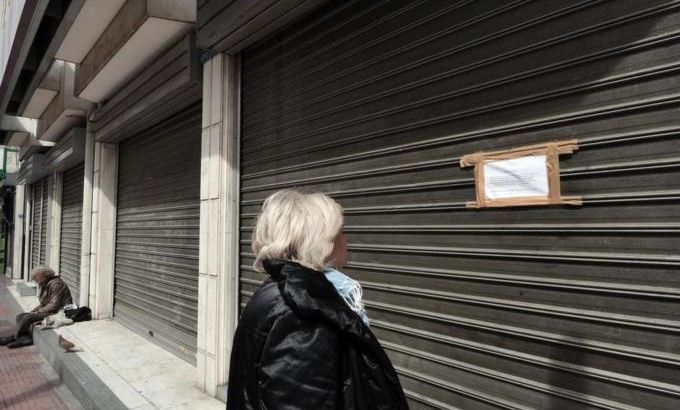Cyprus to reopen banks on Thursday
After nearly two-weeks in lockdown, Cyprus banks to reopen but with temporary limits on daily withdrawals.

Cyprus has confirmed that its banks would reopen after a nearly two-week lockdown, but with temporary restrictions which limit daily withdrawals.
The banks will reopen on Thursday, from 10:00 GMT to 16:00 GMT, two days after the island nation’s newly elected conservative government clinched a deal with international creditors to secure an emergency loan of nearly $13bn to save the country from bankruptcy.
Keep reading
list of 4 items‘We need you’: Solomon Islands’ support for US agency’s return revealed
Why are nations racing to buy weapons?
Parallel economy: How Russia is defying the West’s boycott
Michalis Sarris, the Finance Minister issued a decree on Wednesday for temporary restrictions limiting daily withdrawals to 300 euros ($385), which he said were needed to prevent the “collapse of credit institutions”.
The deal, which called for closing down of the Popular Bank, also known as Laiki – the country’s second largest bank – and implementation of austerity measures, has sparked protests.
Almost 1,500 anti-austerity protesters marched on the presidential palace on Wednesday to protest the EU-IMF rescue package which delivers a major hit to big bank depositors and costing many their jobs.
At least two shipping containers reportedly filled with cash were delivered to the central bank in Nicosia on Wednesday night, according to AFP news agency.
European leaders said the deal averted a chaotic national bankruptcy that might have forced Cyprus out of the euro.
A banking official said on Wednesday that new controls will include restrictions on large-scale transfer from Bank of Cyprus and Laiki, two of the country’s largest and troubled lenders, which are both being restructured.
Authorities are looking to increase the daily withdrawal limit from 100 euros to 300 euros, for at least a week until the situation stabilises, according to the official who spoke to AP news agency.
Banks will have heightened security across the island nation for the “comfort of both bank staff and clients, with the police also present” according to John Argyrou, the Cyprus managing director of private security firm G4S, which will deploy 180 of its staff to all bank branches.
“There may be some isolated incidents, but it’s in our culture to be civil and patient, so I don’t expect anything serious,” said Argyrou.
Run on banks
“Banks will open on Thursday … We will look at the best way to limit the possibility of large sums of money leaving, and not imposing punitive conditions on the economy, businesses and individuals,” Sarris said in the interview.
The central bank governor said earlier that “loose” controls would apply temporarily to all banks.
Earlier, the finance minister said they could be in place for weeks. Banks have been shut since final bailout talks got under way in mid-March.
Russia, whose citizens have billions of euros in Cypriot banks, cautioned Nicosia against imposing onerous controls on healthy banks.
“If there are such measures, this will not foster trust but only provoke additional problems for participants, depositors,” Russian Finance Minister Anton Siluanov, in South Africa for a summit of the BRICS emerging powers group, told reporters late on Tuesday.
State-controlled Russian bank VTB has a subsidiary in Cyprus, Russian Commercial Bank, which has not been affected by the bailout deal.
Siluanov cautioned that Russian willingness to restructure and extend a 2.5bn euro loan to Cyprus in 2011 would depend on the island’s decision on capital controls.
“We will discuss (restructuring of the loan) in the context of the decisions the parliament adopts,” he said. “We are prepared to discuss within these parameters.”
Bank executive sacked
Meanwhile, the chief executive of the Bank of Cyprus, the island’s biggest lender, was sacked by the central bank governor as part of the bailout deal, state media said.
Yiannis Kypri was fired on the instructions of the so-called troika of the European Union, European Central Bank and International Monetary Fund, the Cyprus News Agency reported.
The terms of the 10bn euro ($13bn) rescue have stirred popular anger within Cyprus at the country’s partners in the EU, notably Germany, the bloc’s main paymaster and fiercest advocate of austerity.
On Tuesday, up to 3,000 high school students protested at parliament, in the first major expression of popular anger since the bailout was agreed in the early hours of Monday morning in Brussels.
The deal largely side-stepped parliament, and has triggered opposition calls for a referendum.
“They’ve just got rid of all our dreams,” one student, named Thomas, said.
Outside the central bank, about 200 employees of the country’s biggest commercial lender, the Bank of Cyprus, demanded the resignation of central bank governor Panicos Demetriades, chanting “Hands off Cyprus” and “Disgrace”.